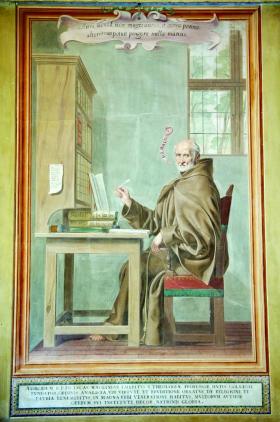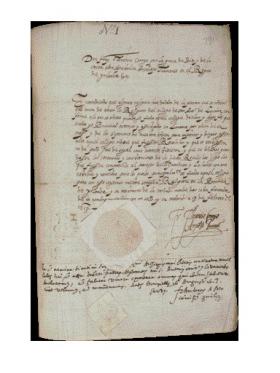Luke Wadding (1588–1657): the only Irishman to receive votes in a papal conclave
Published in Issue 4 (Jul/Aug 2007), News, Volume 15
Luke Wadding OFM, founder of St Isidore’s College, Rome. (St Isidore’s College, Rome, Foto Gioberti Studio)
Luke Wadding was born on 16 October 1588 into a prominent Old English merchant family in Waterford. He was particularly well connected on both sides of his family. His mother, Anastasia Lombard, belonged to another important Old English family. Members of the Wadding family supplied mayors to Waterford City, and Luke Wadding was related to a number of famous Irish bishops of the time, among them Peter Lombard, archbishop of Armagh, David Rothe, bishop of Ossary, and Patrick Comerford, bishop of Waterford. Little is known of his early education in Waterford, although it would seem that he acquired a knowledge of Latin, probably not a difficult task for someone with such linguistic flair: in his lifetime he became proficient in Hebrew, Greek, Portuguese, Spanish and Italian. After his mother’s death from the plague in 1602, Wadding accompanied his brother Matthew, a merchant, to Lisbon and soon afterwards joined the Franciscans. He was ordained in 1613. He began his studies in philosophy and theology in Portugal and was then invited to join the Spanish Franciscan province, where he became a lecturer in theology in the renowned University of Salamanca. His formation in Portugal and in Spain brought him into contact with some of the most influential Catholic teachers and intellectuals of the time, including the Jesuit Francisca Suárez. Once in Salamanca he gained a reputation as a theologian with a particular interest in the historic and spiritual tradition of the Franciscan Order.
His move to Rome followed appeals from Philip III of Spain to Pope Paul V (both of whom were patrons of St Anthony’s Irish College, Louvain) concerning the definition of the doctrine of the immaculate conception of Mary. In July 1618 Bishop Antonio de Trejo who headed a royal Spanish delegation to Rome, chose Wadding as his theologian and secretary to the delegation. Established in Rome, at first based in the Spanish Franciscan church of San Pietro in Montorio, the burial-place of Hugh O’Neill and his son and of Rory and Cathbar O’Donnell, he began a prolific career in historical, philosophical and theological writings. He worked with the commission on the immaculate conception, producing four volumes on the question. He edited concordances of the Hebrew and Latin Bibles. His fame as a scholar, however, mainly rests on his commentaries on the works of the Franciscan theologian Duns Scotus (d. 1308) and his masterly treatises on the history of the Franciscan Order, the Annales Minorum (the Order’s history from 1208 to 1540) and the Scriptores Ordinis Minorum (a collection of the primary sources of the Order). That he is regarded as the father of the history of the Franciscans to this day was recognised in January 2007, when the archive of the General Order in Rome was named after him.
Like his fellow Irish Franciscan Florence Conry, founder of St Anthony’s in Louvain, Wadding recognised the need for the establishment of a house of studies for Irish students in Rome. With the assistance of Cardinal Ludovico Ludovis, the cardinal protector of Ireland and one of Wadding’s many influential friends in Rome, he founded St Isidore’s College# in 1625. Like St Anthony’s, the early years of St Isidore’s were precarious, with Wadding seeking financial support to keep it open and also fending off the Jesuits’ desire to educate Irish students in Rome. St Isidore’s remained an Irish Franciscan college and developed into a centre of Scotist studies, dedicated to the study of Duns Scotus. It also became a house in which novices were trained to return to Ireland to labour and preach, and to that end, again like St Anthony’s, an Irish printing press was set up there.
Although Wadding spent most of his adult life on the Continent, his influence in Ireland and his interest in Irish affairs often led him into controversy. From the 1630s the Vatican often consulted him with regard to episcopal appointments and other offices in Ireland. His own wealthy Old English family background, along with the constant rivalry in the seventeenth century between the Irish and Old English for ecclesiastical and political authority, led to accusations of Old English bias. He also occasionally became embroiled in the machinations of European and Franciscan factions in Rome, mainly centred on French and Spanish jealousies. In an Irish context, his influence and also his precarious position between so many Irish factions came to a head during the Catholic Confederacy in the early 1640s. His pleas to an otherwise disinterested papacy and Spanish monarchy led to Archbishop Rinuccini being sent as papal envoy to Ireland in 1645. He also managed to obtain support for Owen Roe O’Neill and the Irish brigades on the Continent to return to Ireland. In consequence he got the reputation of being a gun-running priest. Despite that, in the maelstrom of conflicting Irish Catholic factions of the Confederacy, Wadding was at various stages criticised by all sides. It would appear that in promoting his main concerns, that of ensuring that Ireland remained Catholic and of maintaining a united Franciscan province in Ireland, he fell foul of many. He died in St Isidore’s in Rome on 18 November 1657 and is interred in the college he had founded.

Signature of Florence Conry, founder of St Anthony’s, Louvain, from the Luke Wadding papers. (UCD–OFM Partnership)
A full, critical account of the complex life of Luke Wadding—as is the case with so many of that phenomenal generation of Irish Franciscans—has yet to be written. Perhaps this may be due to the varied aspects of his career—philosopher, theologian, ecclesiastical and international statesman, Franciscan, Irish politician. Or perhaps the task is daunting for any scholar who faces the vast amount of surviving manuscript and print material relating to him that has survived. For example, a scholar need only consult the corpus of Wadding papers classified as the OFM-UCD ‘D manuscripts’, recently transferred from the Franciscan Library, Killiney, to University College Dublin, to appreciate its richness. Consisting of thousands of documents relating to the ecclesiastical, political and scholarly history of seventeenth-century Ireland, they are a testament to Wadding’s importance and more so to the significance of the Irish Franciscan archive as a national repository for the study of Irish and European history. While one volume of the Wadding papers was edited by Brendan Jennings and published by the Irish Manuscripts Commission in 1953, much more needs to be done in the fields of conservation, cataloguing and analysis. The first steps in conservation are in train under the auspices of the UCD Mícheál Ó Cléirigh Institute and the UCD School of History and Archives with funding from the Heritage Council. Susan Corr, an expert paper conservator, has begun to treat documents to ensure that they will survive to be used as a vital source for Irish history well into the future.
The commemoration of Wadding’s death forms part of the national ‘Louvain 400’ celebrations being coordinated by the Ó Cléirigh Institute. A special exhibition dedicated to Wadding will open in the Treasures Museum in the Granary, Waterford City, in mid-November 2007. For further information on ‘Louvain 400’ see www.louvain400.eu, and on the work of the UCD Mícheál Ó Cléirigh Institute for the Study of Irish History and Civilisation contact john.mccafferty@ucd.ie.
Edel Bhreathnach is the Louvain 400 coordinator at the UCD Mícheál Ó Cléirigh Institute for the Study of Irish History and Civilisation.
















